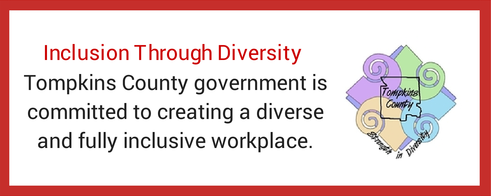The Tompkins County Office of Human Rights (TCOHR) is a County department which facilitates the filing of human rights complaints with the New York State Division of Human Rights (NYSDHR). Such complaints include allegations of discrimination in housing, employment, public accommodation, education and other areas covered by New York State Human Rights Law:
The office makes referrals to legal and other regarding interpretation of local and state human rights laws as well as federal laws and offers advice on human rights concerns. TCOHR also organizes education and outreach initiatives addressing human rights and social justice issues and, in partnership with CNY Fair Housing in Syracuse, affirmatively furthers fair housing.

Our Mission Statement
The Tompkins County Office of Human Rights (TCOHR) works to end discrimination and promote human rights education. Our mission is to end all forms of unlawful discrimination, support people who experience discrimination, and provide human rights education.
The Human Rights Commission
The Tompkins County Human Rights Commission (TCHRC) is a volunteer advisory group appointed by the Tompkins County Legislature for the purpose of fostering mutual understanding and respect among all persons in Tompkins County. The general role of the TCHRC is to encourage equality; discourage discrimination; and to serve as an advisory board to the Office of Human Rights. Commissioners (15 in all) must be residents of the County.
Tompkins County Charter - Human Rights Commission

Complaint Process
File A Complaint
Collaborations & Initiatives
On this page you will find information about projects on which the Tompkins County Office of Human Rights has partnered with other local stakeholders.
Tompkins County Local Antidiscrimination Laws
Existing Local Laws
Tompkins County Code Chapter 92: Antidiscrimination
Promulgated in 2004, this local law provides protections to residents based on sexual orientation, gender identity, and gender expression in the areas of housing, commercial space, lending, employment, education, and places of public accommodation.
Everyone has basic rights under the U.S. Constitution and civil rights laws. Learn more here about what your rights are, how to exercise them, and what to do when your rights are violated.